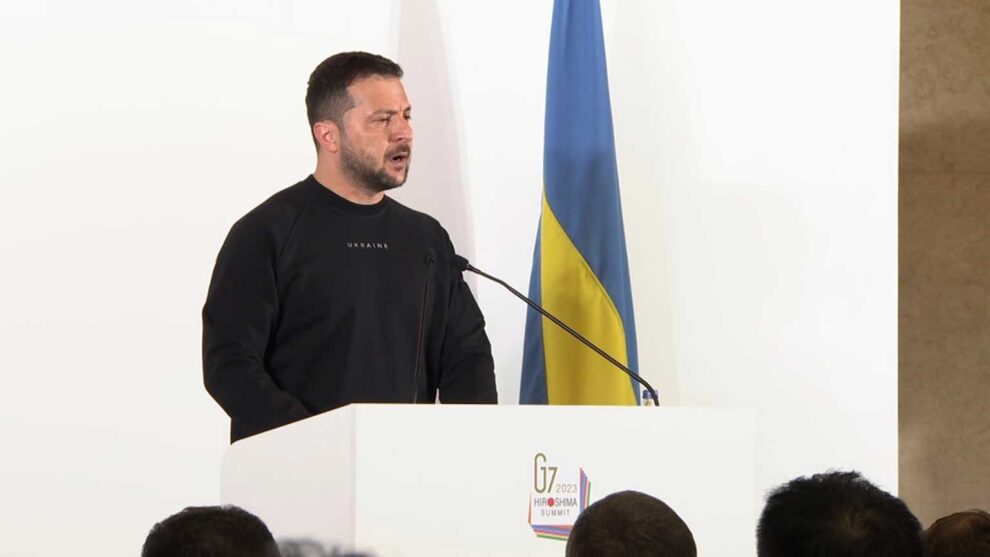Ukraine’s leader knows he needs to win over nonaligned countries such as Brazil and India to increase the pressure on Russia
Normally G7 summits are about battling for the free world comma by comma, as diplomats parse lengthy communiques of ephemeral significance long into the night. Words, after all, constitute much of a diplomat’s work.
At the Hiroshima G7 some of the communiques emerging from the summit do matter, notably the toolbox on de-risking trade with China, but the true significance of the summit lay in Volodymyr Zelenskiy’s scene-stealing visit courtesy of a ride in Emmanuel Macron’s French aircraft.
It was the culmination of a Ukrainian realisation that for months they have been talking to wrong people.
Yes, it is essential to keep lines constantly open to Ukraine’s invested allies in the west, reaping the rewards such as Joe Biden’s decision finally to lift his veto on Ukrainian pilots training to fly US-made F-16 fighter aircraft, but the identification of the west with Ukraine’s cause is almost complete. Ursula von der Leyen, the president of the European Commission, ended her remarks by saying “Slava Ukrajni – Glory to Europe”.

But Ukraine for months has known it is not telling its story clearly enough to the phalanx of 40 or so nonaligned states that have abstained at successive UN general assembly votes on the war. India, Brazil, China and as many as 20 African states have sat on the sidelines in the key votes.
In the autumn it decided there was no substitute for its own diplomats making their case, rather relying on US or UK intermediaries.
It has involved a change in mindset and strain on resources. Ukraine, for instance, has only 10 embassies throughout Africa.
In October the foreign minister, Dmytro Kuleba, undertook a four-nation tour of Africa, visiting Senegal, Ivory Coast, Ghana and Kenya. “Russia’s narrative has been very present here,” he said. “Now it’s time for Ukrainian truths.”
Over the ensuing week, Kuleba attempted to counter Russia’s three “lies” as he put it to African journalists. He noted that Russia had first attacked Ukraine in 2014 when Ukraine’s policy was neutrality not Nato membership.
The second Russian lie was that Russia and Ukraine were actually one country, and so the Russian president, Vladimir Putin, had the right to impose his will on Ukraine. “In fact we are very different countries with our own languages, cultures and histories. Imagine your neighbour coming to you and saying your language, culture and history do not exist. Your statehood is a mistake.”
The third lie was that “only Russia wanted to negotiate peace”. Kuleba offered a similar message at the weekend when speaking to the Association of Caribbean States, the first Ukrainian to do so.
Emine Dzhaparova, the deputy foreign minister, brought similar talking points when she travelled to India in April, referencing similarities in the two countries’ struggles against colonialism but also pointedly wondering why India’s national security adviser, Ajit Doval, had visited Moscow three times recently and never flown to Kyiv.
All this is not about Ukraine piling up an extra 20 votes at the UN for the sake of it, but has a practical purpose. Ukraine wants these countries’ political support for a peace summit it hopes to hold in July but also wants to stem the sanctions leakage.
The one-on-one meetings Zelenskiy has been able to hold with the Gulf states – notably with the United Arab Emirates’ deputy prime minister in Jeddah – and with the Indian prime minister, Narendra Modi, in Hiroshima may not be “a gamechanger” as Macron claims. However, they gave Zelenskiy a chance to point out that breaking the west’s sanctions on Russia, while legal, is ultimately immoral and certainly not an act of neutrality.
His single biggest target was India, and Zelenskiy secured his first meeting with Modi. Indian orders of Russian oil increased 22-fold in 2022, most of it to just two firms. As a result Russia’s estimated oil export revenues increased by $1.7bn (£1.37bn) to $15bn on the back of these higher exports and less discounting. But persuading India to stop importing Russian oil at low prices is made even harder when Europe is itself re-importing this oil from India in refined form.
At least Zelenskiy got facetime with Modi. By contrast, the Brazilian president, Lula de Silva, citing “scheduling reasons” refused to meet Zelenskiy one on one. The Brazilian delegation briefed it felt cornered because it had been given no prior warning Zelenskiy was invited, or would be seeking a meeting. The Brazilian side say a time was eventually agreed to meet but Zelenskiy did not arrive.
In his speech to the G7, Lula said that he “condemns the violation of Ukraine’s territorial integrity” and, in line with the Charter of the United Nations, “vehemently repudiates the use of force as a means of resolving disputes”.
In truth Lula’s stance on Ukraine has been evolving ever since on a visit to China he blamed Nato expansionism and said the US must “stop promoting war and start talking about peace”. Lula was accused of aping Moscow’s talking points.
At the same time his reluctance to sign up to a pro-western agenda remains undimmed. He told the G7 that the solution to the current systemic threats “does not lie in the formation of antagonistic blocs or responses that contemplate only a small number of countries”. It makes no sense to call on emerging countries to contribute to resolving the crises facing the world without their concerns being addressed, Lula said, while also calling for a reform in the composition of the main global governance bodies such as the International Monetary Fund and the UN security council.
Ultimately, until this range of issues is addressed, Zelenskiy’s increasingly artful diplomatic outreach will only take him so far.
Source: theguardian















